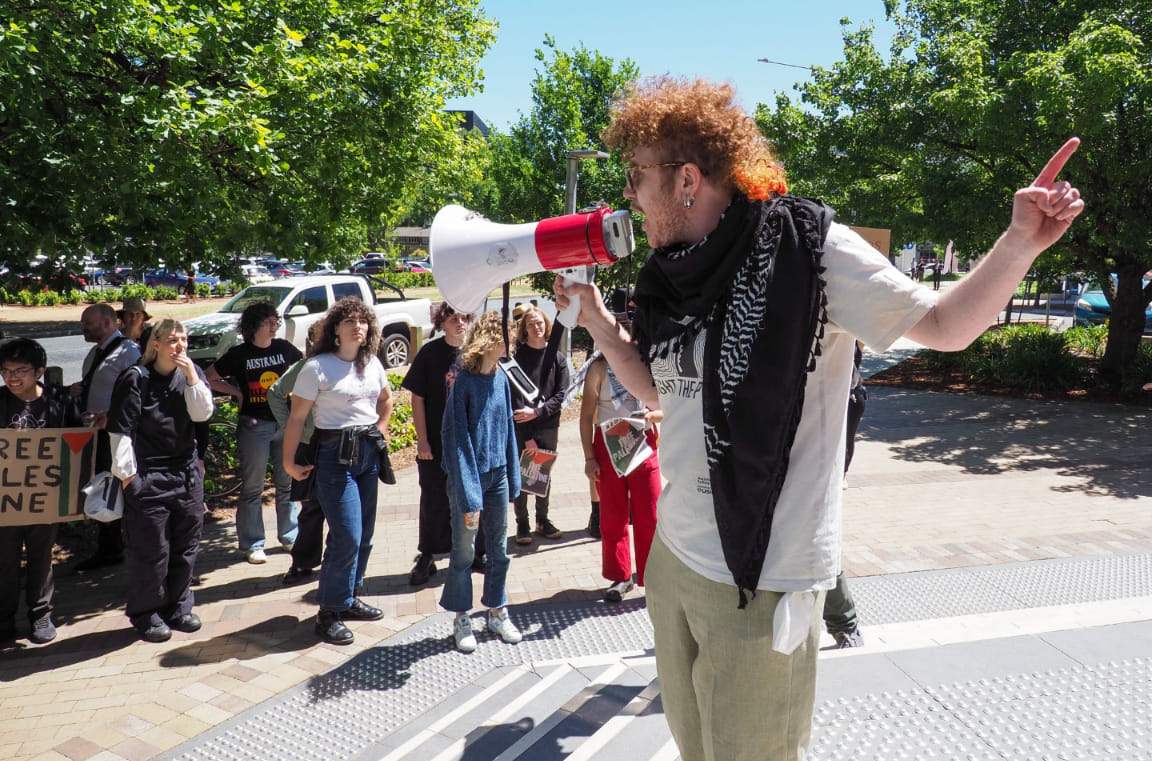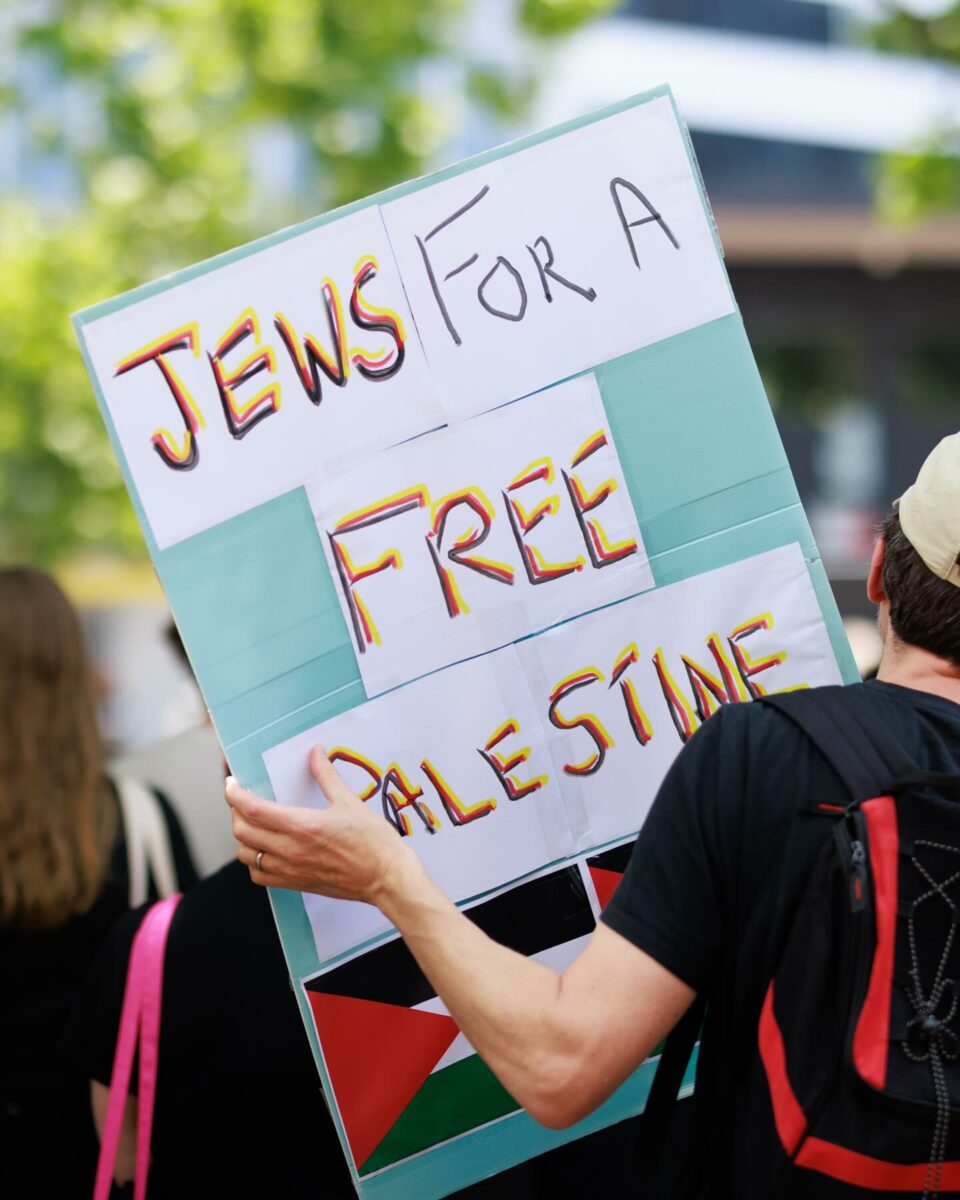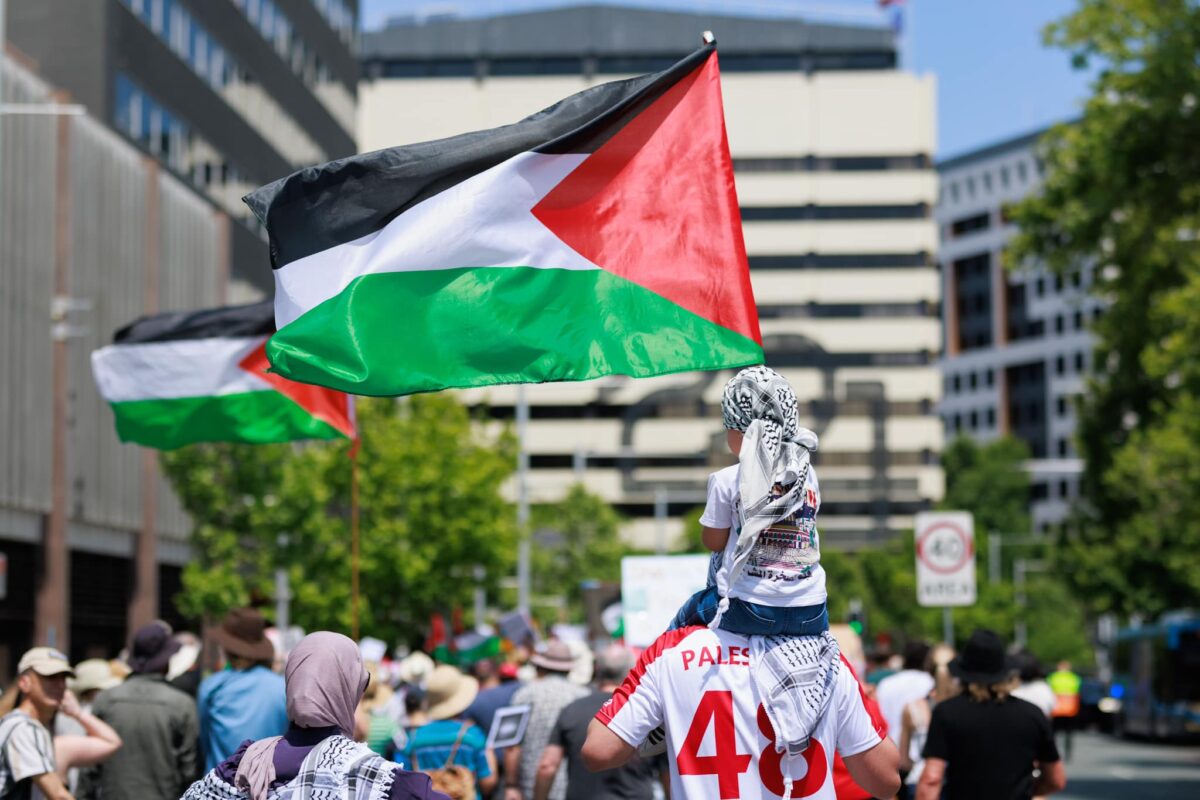Editor’s note: Given the on-going situation unfolding in Palestine, Woroni reached out to multiple ANU students over a period of time until this article was published. This article is a reflection of individuals who provided a comment.
Fervent contestation over Israel’s siege in the Gaza Strip has isolated Jewish and Palestinian communities and inflamed social tensions in Canberra, just as it has across Australia.
The city’s Palestine Action Group has led weekly rallies and other actions since hostilities surged in October. Protestors meet in Garema Place and march around the city’s centre to decry Israel’s actions in Gaza and demand a ceasefire.
A strong contingent of ANU students attend the protests, reflecting the stridently anti-Zionist tone of ANU’s left-wing student politics, alongside hundreds of Canberrans of diverse ages and backgrounds.
While Canberra has avoided the gruesome spectacles seen outside the Sydney Opera House and in Melbourne hotel lobbies, activism continues to cause anguish in communities linked to the conflict.
One ANU student in the Jewish community told Woroni that discussions “are not being given the delicacy, empathy or nuance that they should be, [so] the current climate is generally unhelpful and often distressing”.
Another said they fear “the whole movement is just Jew hatred,” due to protestors’ targeted criticism of Israel, “the world’s only Jewish State”.
“People can use anti-Zionism as a guise for antisemitism,” they said.
The student said the rising protests have made them feel less Australian. “My identity, before this, was Australian-Jewish,” they said. “After this, it’s probably Jewish-Australian. Because I can’t trust Australia.”
However, ANU students attending rallies said they were motivated by support for Palestinian lives against Israeli siege on Gaza.
“Israel has a right to defend itself, but it doesn’t have a right to collective punishment,” one student told Woroni.
“If you look and you see the apartment buildings that have just been decimated … and you think it’s horrible, this is what you can do,” another said. “You can show up. You can yell. You can march.”
One protesting student cited the effectiveness of “anti-war movements,” while another aimed to “show solidarity not just with Palestinians in Palestine but with the Palestinian community in Canberra”.
A teenage Canberran said he was protesting for Palestinian relatives who were “upset ‘cos they don’t know if their family’s coming home or not”.

Filling the on-campus silence
The Garema Place protests have filled a vacuum of political discussion at ANU left by the silence or equivocation of the University and the Australian government.
While dozens of ANU’s teaching staff and researchers have signed open letters in support of Palestine and a ceasefire, the university has avoided making explicit statements on the issue. Acting Vice-Chancellor Professor Grady Venville in October noted that “the escalating conflict in the Middle East is deeply concerning,” writing in the uni’s On Campus student newsletter.
The lack of ANU advocacy has drawn student cynicism, with one protesting student saying they were “disappointed that I haven’t seen anything from ANU”.
Another observed that ANU “took a political stance on the Voice to Parliament, but then not taking a stance on this – it’s pretty telling”.
The university earlier this year avoided adopting a controversial definition of antisemitism that would have considered criticism of the state of Israel as antisemitic.
ANU’s Socialist Alternative group has filled the on-campus silence, helping organise and promote the Garema Place rallies. While some students are suspicious of the left-wing faction’s heavy engagement in the cause, others welcome its efforts to lead protests. One student protestor told Woroni “I feel like they don’t actually represent my viewpoint that well, but this is the closest thing there is on this issue.”
ANUSA has advocated in favour of Palestine, with executive officers attending the rallies and providing water and loudspeakers. Staff at the Association’s Brian Kenyon Student Space have also promoted the protests on social media and provided materials to make banners.
Executive officers have also demanded the National Union of Students stand with Palestine, speaking at the Union’s National Conference. ANUSA has previously passed motions on the Student Representative Council in support of Palestine, namely supporting Pro-Palestinian activism on anniversaries of the Nakba. However, the Union has yet to pass a similar resolution after the 7th of October, despite the efforts of some activists on the SRC. Anti-Israel motions from years past have drawn accusations of antisemitism.
ANUSA’s BIPOC Department has also made social media posts and run events in solidarity with Palestine.

Simmering tensions
But activism around the conflict has also worsened the suffering and social tensions faced by diaspora communities in the wake of resurgent hostilities.
One student in the Jewish community said “There’s lots of Israelis on campus [but] they won’t say they’re Israeli, because it’s like persona non grata.”
The treatment of both pro-Israel and pro-Palestine posters illustrates the toxic tone of on-campus discussion. Student groups have put up advertisements for the Garema Place rallies and posters calling for the return of Israeli hostages. But, as another Jewish student observed, “both hostage posters and Palestine rally posters are torn down quickly after they’re put up”.
They argued “this is genuinely terrible for both sides” and noted that “Jewish students who lost family in the October 7 attack feel a huge amount of grief that isn’t helped by tearing down posters”.
The protest chant “From the river to the sea, Palestine will be free” has become another flashpoint as students contest the role of activism, with one Jewish student saying that “all Jews look at it as a genocidal call to wipe us all out”.
But members of the Jewish community hold diverse views, with another student saying critics of the chant “don’t completely understand where protestors are coming from when they say this”.
Numerous speakers at the Garema Place rallies have explicitly decried all violence, including the “appalling attacks from Hamas,” and framed the “river to the sea” chant as a call only for Palestinian liberation.
A protesting student with Jewish heritage said “When I show up to this rally, I don’t feel in any way threatened … I feel safe at this rally, and I think Jewish people will feel safe at this rally.”
ANU’s BIPOC Department has also caught criticism from some Jewish students for fanning distress in their ethnic community. Department officer Selena Wania confirmed she had “received private grievances through email from students regarding our pro-Palestine stance”.
But Wania said she has heard “a multitude of experiences amidst discussions and actions around the genocide in Palestine” in her discussions with BIPOC students.
“There is wide empathy, grief, sadness, and frustration as the situation worsens in Palestine and our government and universities refuse to speak out against it,” she said.
Wania emphasised that students “are more than just upset. We are strong and dignified and our resilience in painful times like these must be acknowledged.”
One student in the Jewish community asked for more listening, telling Woroni “All sides feel extreme fear and sadness right now and that has led to hateful conversations that lack the empathy required”.
Palestinian students are understandably reluctant to discuss their perspectives or publicise their identity in an environment of fear and hate. Those approached by Woroni for this article declined to comment.
Edit: This article was edited on 05.01.2024 to add in the following: “ANUSA has previously passed motions on the Student Representative Council in support of Palestine, namely supporting Pro-Palestinian activism on anniversaries of the Nakba. However, the Union has yet to pass a similar resolution after the 7th of October, despite the efforts of some activists on the SRC”.
Students and staff can submit News Tips on our website or through submissions to woroninewseditor@gmail.com.
We acknowledge the Ngunnawal and Ngambri people, who are the Traditional Custodians of the land on which Woroni, Woroni Radio and Woroni TV are created, edited, published, printed and distributed. We pay our respects to Elders past and present. We acknowledge that the name Woroni was taken from the Wadi Wadi Nation without permission, and we are striving to do better for future reconciliation.
